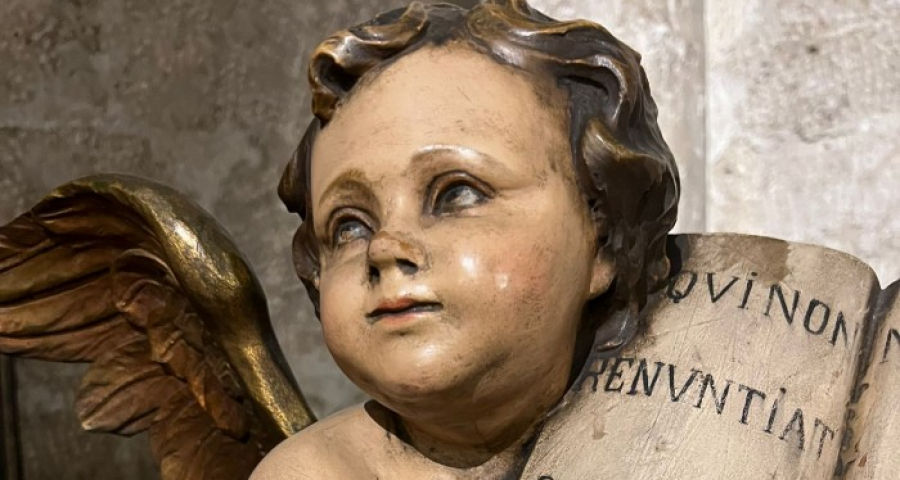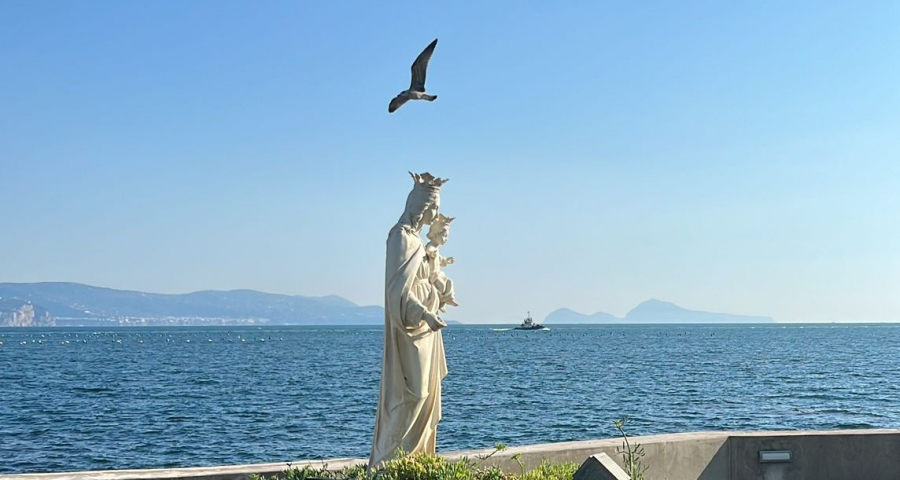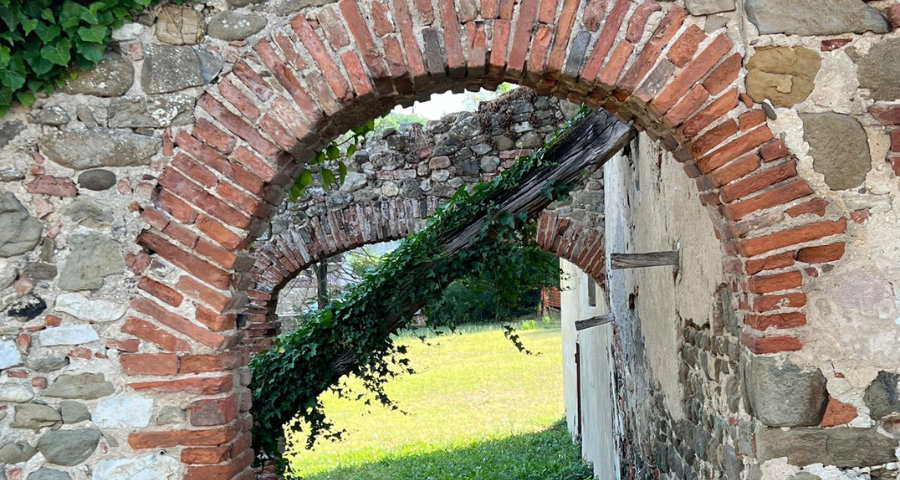The mystery revealed/20 - The Bible will continue to live if as long as it frees us from both old and new idolatries
By Luigino Bruni
Published in Avvenire 14/08/2022
So says the god Indra: "Offer me a sacrifice, I'm hungry”
Satapatha Brahmana, 11, Vedic texts
This concludes the commentary on the Book of Daniel and on his and our desire to dream of God. The story of Bel and the dragon leaves us a new teaching on idols and on messianic hope.
«And Daniel was a companion of the king, and was the most honoured of his friends. Now the Babylonians had an idol called Bel, and every day they spent on it twelve bushels of fine flour and forty sheep and fifty gallons of wine. The king revered it and went every day to worship it. But Daniel worshiped his own God» (The Book of Daniel 14,2-4). The last chapter in the Book of Daniel goes back to the major themes of the first part. Bel is the Akkadian name of Marduk (Jeremiah 50,2), son of Ea. In Babylonian mythology (Enuma Elis, 2nd millennium B.C.) he is the chief god of the pantheon who had created the order by defeating Tiamat, the dragon of the abyss, a female deity of the stormy oceans and primordial chaos.
The story opens with the theme of food for the god Bel. Food for the gods was common to many archaic religions. The people had to "keep the gods" (the dullu), to keep them alive by feeding and quenching their thirst. As one cannot go to the king without gifts and offerings (the kings-gals), so one cannot go to the temple without bringing gifts, food and wine to the gods. Feeding the gods was then intertwined with the very common tradition, in Egypt and among the Italic peoples as well, of feeding the dead, especially on the occasion of some festivals when they returned to the living. In Mesopotamia, people imagined the court in heaven being symmetrical to human ones, and therefore every day the god Marduk was fed more or less with the same amount of food and drink that was deemed necessary to feed the king and his family. Food for the gods was therefore a rite that intersected with the great theme of sacrifices to the gods, which often consisted of offerings of animals, flowers and vegetables (fava beans were typical for the dead), of (liquid) libations was at times poured on the graves of the dead. The food offering often became a community event in front of the god who attended the banquet and, sometimes, had a chair and a plate reserved for him/her. The Babylonian temple was equipped with kitchens and dishes, bedrooms and side rooms for the family of the deity. There was an image of the god Marduk in his chambers next to which food was left in the temple; then a curtain was drawn while the god ate in peace, and later when it was removed the food was gone.
If a god is alive and is therefore active, if the dead continue a mysterious life of their own in the afterlife, then they must also eat and drink, because the living eat and drink, and this includes the gods. The fraternal banquets of the first Christian communities, the agape of which St. Paul speaks to us, retained traces of these archaic sacrificial banquets, but with the radical novelty that in the Eucharistic banquet it is God who nourishes us, by giving himself in the form of bread and wine. For the Jewish scribe of the second century B.C. who wrote this tale about Bel, the god Marduk could not eat the food because he was simply an idol and therefore not really alive: he was a piece of wood, a scarecrow in a watermelon field. Hence, to Daniel, revealing the lies of the priests in front of the king, showing that it was they who ate the food and not Bel, was a powerful tool to reveal the phony nature of those deities: «But Daniel worshiped his own God. And the king said to him, “Why do you not worship Bel?” He answered, “Because I do not revere man-made idols…” The king said to him, “Do you not think that Bel is a living God? Do you not see how much he eats and drinks every day?” Then Daniel laughed, and said, “Do not be deceived, O king; for this is but clay inside and brass outside, and it never ate or drank anything”» (Daniel 14,4-7).
It is interesting to note a detail. The king believes that Bel is alive because he eats and drinks. A decisive element in every idolatrous cult - of totems, of ideas, of people – is revealed to us here. The god eats is therefore he or she is alive: it is the rite of nourishment that tells the truth of the cult, not the other way around. In order to convince the skeptical Daniel, the Babylonian king in fact says to him: «Do you not see how much he eats and drinks every day?». It is daily liturgy that creates worship, and it is worship that generates culture. Back in the day, in the Babylonian temples, today, in the temples of capitalism, where culture is nourished by daily cults, nourishing secularized gods. Thus in order to attempt to truly change capitalist culture it is necessary to change the very daily cults of work and consumption, do not delude yourself, writing books on economic culture is not nearly enough. Just as the king of Babylon no longer asked himself any questions regarding the true or false nature of his god and deduced it from his cult - he eats the food we bring him, therefore he is alive - we too have stopped asking ourselves about the truth of our economic liturgies, of their justice and equity. We see that the food disappears and believe without seeing (capitalism is, in its own way, a form of faith). A perfect liturgy is infallible until a prophet arrives to ask the question about the nature of the worship, about what happens behind the curtains. However, unlike Babylon, our capitalism does not have a separate chamber and a curtain and a few dozen cheating priests: ours is a palace with three thousand chambers, with thousands of curtains lowered to prevent us from seeing if and how Bel eats, a universe of rooms veiled one inside the other. Hence, the work of Daniel (or Francis) resembles that of Sisyphus: after yet another curtain unveiled, another one is found and the unveiling seems to have no end. However, the Bible gives us great hope: in the end the last curtain will be removed, the mystery will be revealed. This hope is not in vain, as long as at least one prophet remains alive among us, and as long as we do not forget the Bible.
In the story, Daniel has a good game in showing the tricks of the priests. He accepts the challenge that the king proposes to show him that it is not Bel who eats the food. He goes with the king and the seventy priests to the temple, the food is placed in front of the idol and then the doors and windows are sealed. The priests «They were unconcerned, for beneath the table they had made a hidden entrance, through which they used to go in regularly and consume the provisions» (Daniel 14,13-14). Here we have another constant of the Bible, especially of the prophetic tradition (Jeremiah, Hosea): the criticism of sacrifices passes through the unveiling of economic deals and trafficking, and the swindling of priests. Sacrifices are not really useful to God but are very useful to the temple attendants, who feed on the sins of the people and their naive religious ideas.
Daniel had ashes placed in Bel's room, and when the king found that the food had been eaten the next day, «Then Daniel laughed, and restrained the king from going in, and said, “Look at the floor, and notice whose footsteps these are.” The king said, “I see the footsteps of men and women and children”. Then the king was enraged, and he seized the priests and their wives and children» (Daniel 14,19-21). Daniel laughed, for the second time, this chapter is one of the very few places in the Bible where a character (like Sarah) laughs, but if we were better acquainted with the rabbinic culture, we would discover a lot of humour in its sacred books. The ability to tell a joke and play being an essential aspect of human beings (and perhaps also of God), which therefore cannot be extraneous to biblical humanism, as it does not leave out a single iota of humanity from its ark.
The chapter ends with the episode of the dragon, a highly esteemed beast in a lot of ancient and medieval mythology: «There was also a great dragon, which the Babylonians revered. And the king said to Daniel, “You cannot deny that this is a living god; so worship him.” Daniel said, “I will worship the Lord my God, for he is the living God. But if you, O king, will give me permission, I will slay the dragon without sword or club”» (Daniel 14,23-26). In Babylon, dragons were an image of chaos, and of all the terrible sea monsters in the Bible, Leviathan is the most infamous one (drakon is the word that the Greek version of the LXX uses to translate "Leviathan"). Nevertheless, it was also normal in ancient religions to associate various animals to the gods, which according to the Bible had the same idolatrous nature as statues or images. If the god Bel is vanitas, then his sacred animals are too: «Then Daniel took pitch, fat, and hair, and boiled them together and made cakes, which he fed to the dragon. The dragon ate them, and burst open. And Daniel said, “See what you have been worshiping!”» (Daniel 14,27). The plot of the story then becomes more complicated: the people accuse the king of «having turned into a Jew» (14,28) and threaten him with death. Due to fear he hands Daniel to the people who throw him into the lions' den, thus reconnecting the story to the scene in chapter 6. However, once again, God intervenes, through a prophet seized by an angel «by the hair» and dragged from Judea to Babylon, thus saving Daniel from death: «So Daniel arose and ate. And the angel of God immediately returned Hab′akkuk to his own place» (Daniel 14,39).
The Book of Daniel ends with this umpteenth intervention by YHWH, repeating once more to us that the biblical God is first of all a liberator: from the pits of lions, from slavery, from idols, therefore from the wrong ideas of God. Back in the day, as well as in our days, the Bible continues to live as long as it continues, every day, to free us from the slavery of idolatrous ideologies, both inside and outside religions. If the Bible instead of freeing us should become a commodity of comfort, we will transform its God into a useless if not harmful god.
Thus ends this journey that began twenty weeks ago. Maybe I did not think Daniel would be so beautiful, so spiritual, ethical and exciting. I feared that his visions of angels and monstrous beasts would take us too far from our history wounded by a war that broke out in Ukraine just as I was writing the first article in the series at the end of February. This comment was born out of that pain and will forever carry that stigma. Instead, we discovered that even the apocalyptic is history in the Bible, even the angels push us to love the earth more. In the end we are left with visions and wonderful dreams, we are left with the wonderful "Son of man" and his Kingdom that is to come, and that will come if we do not stop dreaming of and praying to him. The desire to start dreaming of God remains even stronger. Will we make it?
After a two week-long break, we will now resume our journey in September with a new series. I just have to thank Marco Tarquinio: the first and foremost joy of these articles comes to me every Saturday afternoon when the article returns to me with his notes, his "improvements", the title of the article conceived by both and its introduction. Thus, even that first edition of my article becomes a collective enterprise, a relational asset of the entire editorial staff (whom I thank). Finally, an enormous thank you to you readers for the kindness I feel growing, in a journey where you have become my needed companions.







_large.png)





